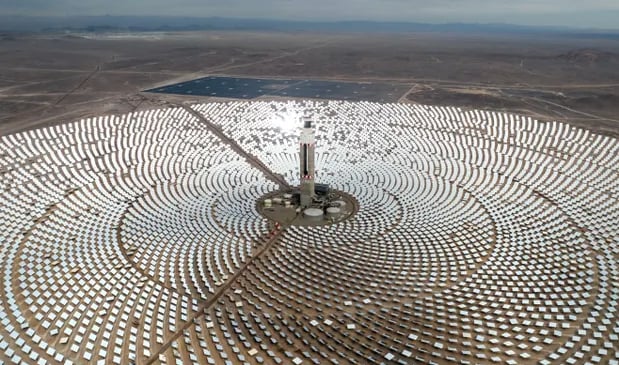November 28, 2025 | 01:04 GMT +7
November 28, 2025 | 01:04 GMT +7
Hotline: 0913.378.918
November 28, 2025 | 01:04 GMT +7
Hotline: 0913.378.918

The Cerro Dominador solar plant in the Atacama desert, Chile. The report says the funding figure would enable a global transition to green energy. Photograph: John Moore/Getty Images
About $2tn (£1.75tn) will be needed each year by 2030 to help developing countries cut their greenhouse gas emissions and cope with the effects of climate breakdown, new data suggests.
The cash will be needed so that poor countries can switch away from fossil fuels, invest in renewable energy and other low-carbon technology, and cope with the impacts of extreme weather, according to a report that was commissioned jointly by the UK and Egyptian governments, and presented at the Cop27 UN climate summit.
The figures, which would cover the needs of all of the world’s developing economies except China, are far higher than any climate finance that has yet been forthcoming to help poor countries.
“Around half of the required financing can be reasonably expected to come from local sources, from strengthening domestic public finance and domestic capital markets, including tapping into large pools of local finance that national development banks are able to mobilise,” the report says.
However, external finance, as well as the World Bank and other multilateral development banks, must also play a key role.
Nicholas Stern, the climate economist who wrote a landmark 2006 review of the economics of climate change, was a lead author of the report. He said: “Rich countries should recognise that it is in their vital self-interest, as well as a matter of justice given the severe impacts caused by their high levels of current and past emissions, to invest in climate action in emerging market and developing countries.
“Most of the growth in energy infrastructure and consumption projected to occur over the next decade will be in emerging market and developing countries, and if they lock in dependence on fossil fuels and emissions, the world will not be able to avoid dangerous climate change, damaging and destroying billions of lives and livelihoods in both rich and poor countries.”
Funding low-carbon economic growth in poor countries would help to lift billions of people out of poverty, create jobs and reduce greenhouse gas emissions.
The money is also needed to help poor countries adapt to the effects of the climate crisis, for instance by building more robust infrastructure, and protections such as seawalls and early warning systems. For the most severe impacts of climate breakdown, which countries cannot adapt to, known as loss and damage, the money would help to rescue those at risk, repair vital infrastructure and help to heal the social fabric – services such as health and education – of countries torn apart by extreme weather, such as devastating floods, droughts, storms and heatwaves, that is likely to worsen as a result of climate breakdown.
Loss and damage is one of the main priorities for discussion at the Cop27 summit in Sharm el-Sheikh, which
Poor countries have been promised since 2009 that by 2020 they would receive at least $100bn a year to help them cut emissions and cope with the impacts of extreme weather. But that target has repeatedly been missed, and is not likely to be fulfilled until next year.
Lord Stern said: “Given the pressure on public budgets in all countries, the role of the multilateral development banks, including the World Bank, will be critical in increasing the scale of external finance for emerging market and developing countries, and bringing down the cost of capital for investors. The flow of finance from these institutions should triple from about $60bn a year today to around $180bn a year within the next five years. This requires a strong sense of direction and support from the country shareholders, and real leadership from the top of these institutions.”
The World Bank has come under increasing criticism in recent months for its perceived failures to direct sufficient funds towards the climate crisis. The Bank will engage in discussions at Cop27.
(The Guardian)

(VAN) A new study reveals how the simultaneous effects of ocean acidification, salinity and loss of oxygen are making the world more fragile.

(VAN) Hopes are growing that the creation of the first 3D turkey gut model could be a turning point in the battle against the virulent blackhead disease.

(VAN) Tyson, America’s biggest meat supplier, plans to shutter one of its largest beef processing plants as the industry continues to struggle with low cattle supplies and political pressure from Washington.

(VAN) New FAO study shows how digital solutions are empowering farmers and fishers to prevent losses and build resilient agrifood systems.

(VAN) Brazil's COP30 presidency pushed through a compromise climate deal on Saturday that would boost finance for poor nations coping with global warming but that omitted any mention of the fossil fuels driving it.

(VAN) Poultry farmers in the UK have been warned that they could face one of the worst winters yet for bird flu.

(VAN) Prices of main-crop paddy have risen sharply, with jasmine rice hitting 16,100 baht per tonne — the highest level in years.